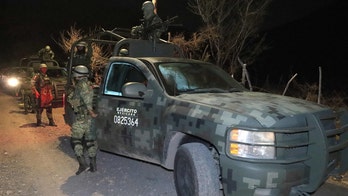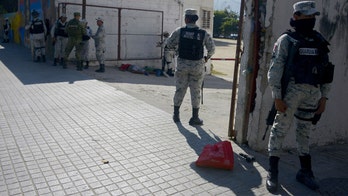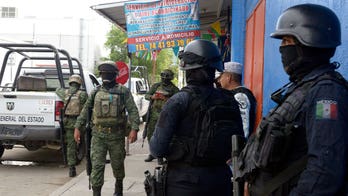The internet, a vast ocean of information and connection, occasionally washes ashore content so disturbing it forces humanity to confront its darkest impulses. Among these grim reminders is the infamous "Funkytown" video. More than just a shocking piece of online infamy, this video serves as a chilling gateway into the brutal realities of Mexican drug cartels, the depths of depravity they can inflict, and the devastating consequences of an ongoing drug war that continues to plague a nation.
Like other examples of cartel violence, the "Funkytown" video is a grim reminder of the dangers posed by organized crime. It compels viewers to grapple with difficult questions about the nature of violence, the role of media in society, and the urgent need to address the root causes of such widespread brutality. This article takes a deep dive into the "Funkytown" phenomenon, exploring its origins, its impact, and the broader context of cartel violence in Mexico.
The Infamous "Funkytown" Video: A Glimpse into Depravity
What is the "Funkytown" Video?
The "Funkytown" video, often referred to as "Funkytown gore" due to its graphic nature, gained notoriety for its extreme violence. Uploaded to kaotic.com on September 26, 2016, by a user named "pinkfloyd" under the title "shocking," the video quickly spread across the internet, leaving a trail of horror in its wake. Its specific details are gruesome and disturbing, involving the prolonged torture of a man, carried out in a manner so inhuman that it defies comprehension. Accounts suggest the victim was a rival gang member, subjected to flaying, torture, and ultimately, beheading.
What makes the "Funkytown" video particularly unsettling is its chilling contrast: brutal cartel violence paired with the upbeat 1980s disco song “Funkytown” by Lipps Inc. This juxtaposition of unimaginable suffering with a catchy, feel-good tune creates a deeply disturbing psychological effect, amplifying the horror and making the content even more memorable, albeit for all the wrong reasons. The video has sparked widespread debates about whether such graphic content should even be shared online, highlighting the ethical dilemmas posed by the digital age.
Origins and Purpose: Cartel Propaganda and Intimidation
The "Funkytown" gore video emerged as a dark and horrifying representation of the violence tied to Mexican drug cartels. It is widely believed to have been created as a form of propaganda or intimidation, a brutal tactic used by cartels to assert dominance over rivals and instill fear in local communities. The video was allegedly filmed by members of a Mexican drug cartel, showcasing their capacity for extreme cruelty. Such acts are not random outbursts but calculated messages designed to warn enemies and consolidate power.
In the ruthless world of drug trafficking, fear is a potent weapon. By disseminating videos like "Funkytown," cartels aim to send an unequivocal message: defiance leads to unimaginable suffering. This tactic not only intimidates rival gangs but also terrorizes local populations, discouraging cooperation with authorities and ensuring a climate of silence and compliance. The significant shock value of the video contributed to the notoriety of cartel violence, fueling discussions about online censorship and the impact of violent media.
The Digital Battlefield: How Violence Spreads Online
The Internet as a Platform for Extreme Content
The infamous "Funkytown" video is a gruesome testament to cartel violence and a chilling example of how the digital age has become a platform for the dissemination of extreme acts of violence. While the internet offers unparalleled opportunities for sharing information, connecting with others, and accessing a wealth of knowledge, it also provides a dark alley for the distribution of content that would otherwise remain hidden. The video's persistent circulation, with numerous copies and references still online, underscores the challenges of content moderation and the enduring nature of internet infamy.
The ease with which such graphic content can be uploaded and shared globally means that the brutal realities of Mexico's drug war are no longer confined to remote regions. They are brought directly into homes and onto screens worldwide, forcing viewers to confront a level of human depravity that is difficult to process. This digital dissemination serves the cartels' purpose of intimidation, extending their reach far beyond their physical territories.
The Broader Implications of Online Cartel Content
The existence and circulation of videos like "Funkytown" raise profound questions about the societal impact of violent media. While some argue that such content is a necessary, albeit horrifying, glimpse into reality that demands attention, others contend that its widespread availability risks desensitizing viewers to violence, normalizing brutality, and potentially inspiring further acts of cruelty. The debates sparked by the "Funkytown" video about online censorship highlight the tension between freedom of information and the need to protect individuals, especially the vulnerable, from exposure to extreme content.
Furthermore, the digital footprint of cartel violence contributes to a global perception of Mexico as a nation consumed by conflict. While this is a complex issue with many facets, the viral spread of such videos undeniably shapes public opinion and international discourse, often overshadowing the resilience and beauty of Mexican culture and its people.
Beyond the Screen: The Realities of Mexican Cartel Violence
A Web of Violence and Social Decay
The "Funkytown" video, while a singular horrifying event, is merely a symptom of a much larger, deeply entrenched problem: the pervasive web of violence and social decay fueled by drug trafficking in Mexico. The presence of cartels is a blight on Mexican society, where turf wars and targeted killings claim countless innocent lives. Drug trafficking fuels a cycle of violence, corruption, and impunity that erodes the fabric of communities and undermines the rule of law.
The violence is not confined to rival gangs; it extends to journalists, politicians, law enforcement, and ordinary citizens caught in the crossfire. The constant threat of abduction, extortion, and murder creates a culture of fear that permeates daily life for millions. This ongoing conflict has devastating consequences for the economy, public health, and social cohesion, turning once vibrant towns into outposts of fear and despair.
The "Funkytown Cartel" and Its Global Reach
While the "Funkytown" video is a specific instance, the "Funkytown cartel" (or the type of cartel that produces such content) employs a culture of fear, resorting to extreme violence to eliminate rivals and intimidate local populations. Although Mexico remains their essential base, the influence of these out-of-control cartels has laid out a presence across the globe. Their networks extend internationally, facilitating drug distribution, money laundering, and other illicit activities that fuel their brutal operations back home.
This global reach means that the consequences of Mexican cartel violence are not isolated. They impact international drug markets, contribute to transnational crime, and pose significant challenges to global security and public health. Understanding the complex dynamics of these organizations, their tactics, and their reach is crucial for any effective strategy to combat them.
Addressing the Root Causes
The existence of a video like "Funkytown" offers a horrifying glimpse into the brutal realities of cartel violence, a stark reminder of the depravity that humans can inflict upon one another. However, simply condemning the violence is not enough. To truly address this crisis, there is an urgent need to tackle the root causes of organized crime, which often include poverty, lack of economic opportunity, corruption, weak institutions, and a pervasive sense of impunity.
A comprehensive approach requires strengthening law enforcement, reforming the justice system, investing in social programs, and fostering economic development in affected communities. It also demands international cooperation to disrupt drug supply chains, combat money laundering, and reduce demand for illicit drugs. Only by addressing these underlying issues can there be hope for breaking the cycle of violence and restoring peace and stability to Mexico.
Summary
The "Funkytown" video stands as a horrifying testament to the extreme violence perpetrated by Mexican drug cartels, serving as a grim reminder of the depths of human depravity and the devastating consequences of the drug war. Its digital dissemination highlights how the internet has become a platform for both connection and the spread of extreme content, sparking critical debates about online censorship and the impact of violent media. Beyond the screen, the video underscores the pervasive culture of fear employed by cartels, their global reach, and the urgent need to address the complex root causes of violence and social decay in Mexico. The fight against organized crime requires a multi-faceted approach, focusing on law enforcement, social development, and international cooperation to bring an end to this brutal reality.



Detail Author:
- Name : Miss Malvina Mante V
- Username : nconroy
- Email : schaefer.lucie@wilkinson.com
- Birthdate : 1992-04-26
- Address : 64997 Johnson Forks Schinnerbury, WV 44041
- Phone : 1-240-553-6048
- Company : Beahan, Schinner and Olson
- Job : Welder
- Bio : Ex quia excepturi voluptas doloribus autem. Sed vitae qui hic non harum eaque totam. Ad iure et labore et non libero. Natus non ea eum optio.
Socials
facebook:
- url : https://facebook.com/mayert1981
- username : mayert1981
- bio : Aliquam aliquam rerum accusamus est quam quo. Laudantium molestiae et porro.
- followers : 5855
- following : 1888
instagram:
- url : https://instagram.com/mayerts
- username : mayerts
- bio : Blanditiis iusto qui delectus aliquam ut distinctio quibusdam. Est ullam architecto qui non.
- followers : 5850
- following : 2149